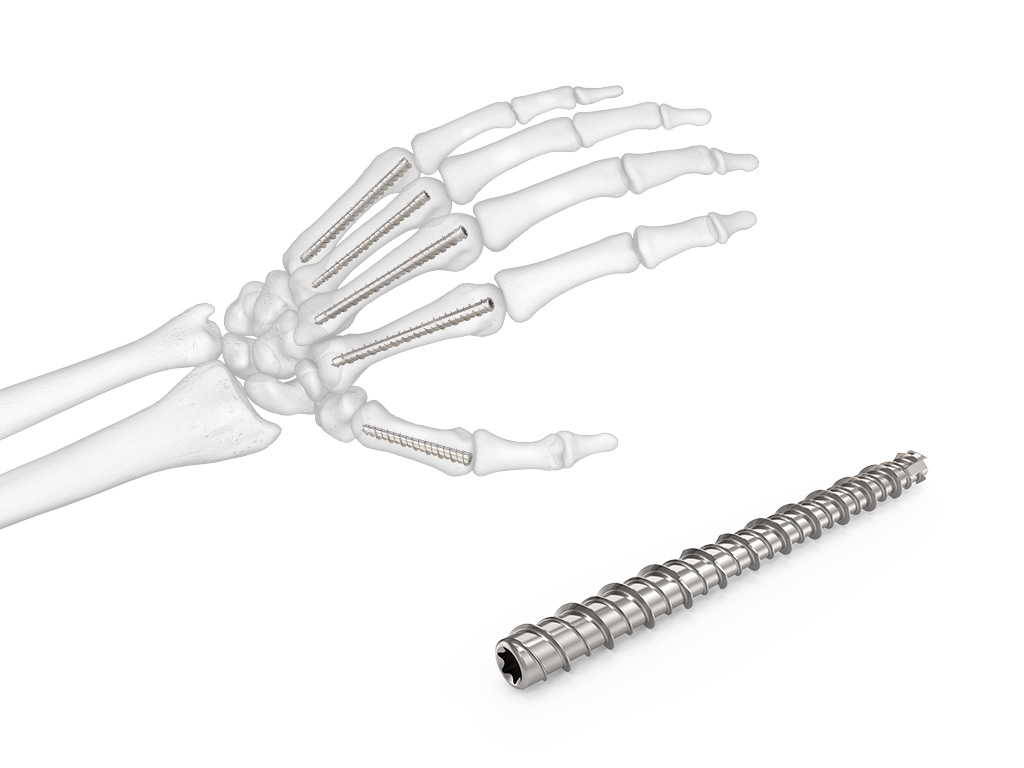
INnate Intramedullary Threaded Nail System
September 16, 2022
Overview The INnate Intramedullary Threaded Nail system features a dual diameter, stainless steel nail with a noncompressive construct to achieve canal fill and stable fixation of metacarpal fractures, avoiding complications such as shortening, and delivering minimal soft tissue damage and early to immediate range of motion. The robust length and diameter offering allows for precise anatomic reduction of all fracture …
Overview
The INnate Intramedullary Threaded Nail system features a dual diameter, stainless steel nail with a noncompressive construct to achieve canal fill and stable fixation of metacarpal fractures, avoiding complications such as shortening, and delivering minimal soft tissue damage and early to immediate range of motion. The robust length and diameter offering allows for precise anatomic reduction of all fracture types and locations.
Indications for Use
The ExsoMed INnate Intramedullary Threaded Nail System is intended for fixation of intra-articular and extra-articular fractures and nonunions of small bones and small bone fragments; arthrodesis of small joints; bunionectomies and osteotomies, including scaphoid and other carpal bones, metacarpals, tarsals, metatarsals, patella, ulnar styloid, capitellum, radial head, and radial styloid.
A New Standard for Metacarpal Fracture Fixation
An intramedullary threaded nail designed specifically for metacarpal fractures, Innate is intended to provide a reliable solution through a simple, minimally invasive approach. The extensive length offering with a differential diameter accurately fits the metacarpal canal and to create stable fixation and precise reduction for all types of metacarpal fractures.
The system is provided sterile-packed. The implants are single-use, while separate disposable instruments kits are available, specific to the implant diameter selected.
Features
- Purpose-built for metacarpal fractures
- Cannulated nail
- Stainless steel
- Noncompressive
- Dual diameter design for optimal canal fill and stable fixation
- 6.0 mm & 4.5 mm diameters
- 25-75 mm lengths
- Both implant and instrument kits are sterile
Key Benefits
- No immobilization necessary: Immediate to early, active mobilization for accelerated healing and quicker return to work and/or daily activities.1-4
- Minimally invasive: Minimally invasive with no secondary procedure or immobilization required.3-6
- Reduced patient follow-up: Minimal to no complications.1-3, 5-7
- Reduced global cost of care: Lower overall cost of care compared to other surgical modalities.6, 8-14
References
- Ruchelsman, D. E., et al. Clinical outcomes of limited-open retrograde intramedullary headless screw fixation of metacarpal fractures. Hand Surgery. 2014
- Grundberg, Arnis B. Intramedullary Fixation for Fractures of the Hand. Journal of Hand Surgery. 1981
- Halanski et al. Cast and Splint Immobilization: Complications. Journal of AAOS. 2008
- Doarn et al. Retrograde Headless Intramedullary Screw Fixation for Displaced Fifth Metacarpal Neck and Shaft Fractures: Short Term Results. 2014
- Beck, C.M., et al. Intramedullary screw fixation of metacarpal fractures results in excellent functional outcomes: a literature review. Plastic Reconstruction Surg. 2019
- Boulton, et al. Intramedullary Cannulated Headless Screw Fixation of a Comminuted Subcapital Metacarpal Fracture: Case Report. Journal of Hand Surgery. 2010
- Moon, et al. Comparison Between Intramedullary Nailing and Percutaneous K-Wire Fixation for Fractures in the Distal Third of the Metacarpal Bone. Hand and Micro Plastic Surgery. 2014
- Data on file.
- Childers, C., Maggard-Gilbbons, M. OR Cost Mean cost per minute, Understanding Costs of Care in the Operating Room. JAMA Surg. 2018;153(4):e176233. doi:10.1001/jamasurg.2017.6233
- Esteban-Feliu I, Gallardo-Calero I, Barrera-Ochoa S, et al. Analysis of 3 Different Operative Techniques for Extra-articular Fractures of the Phalanges and Metacarpals. 2019.
- Fusetti, C., et al. Complications of plate fixation in metacarpal fractures. J Trauma. 2002;52:535-9.
- Soong, et al. Metacarpal fractures in the athlete. Hand and Wrist Sports Medicine. 2017.
- Kollitz, et al. Metacarpal fractures: treatment and complications. Journal of Hand Surgery. 2013.
- Hardy, M. Principles of Metacarpal and Phalangeal Fracture Management: A Review of Rehabilitation Concepts. Journal of Orthopaedic & Spine Physical Therapy (JOSPT). December 2004: 34 (12): P781-799.